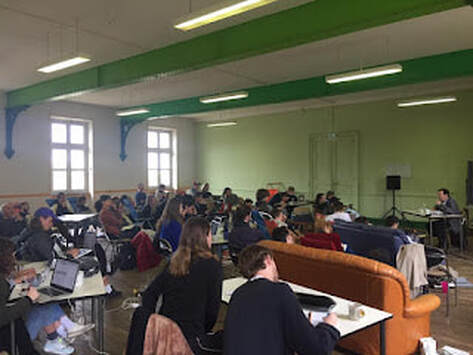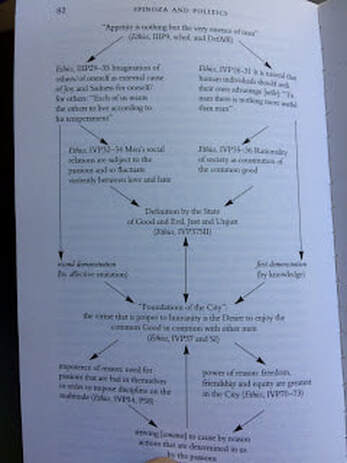|
5/20/2022 Yet Another Effort, Spinozists, If You Would Become Marxists: Marxist Spinozism Against Enlightenment Spinozism. By: Jason ReadRead NowIn a recently published piece in Jacobin (which is a response to this piece in Viewpoint) we see the following statement: "Precisely because of what we affirm in Spinoza, we view his French reception in the twentieth century skeptically. Thinkers such as Deleuze and Althusser largely reject Spinoza’s rationalism, monism, and determinism, reducing his substance to a swirl of anarchic forces, whether in Deleuze’s nomads or in Althusser’s aleatory materialism. These readings perform a kind of “substance abuse,” replacing Spinoza’s objective metaphysics with a Nietzschean play of forces. But a different tradition of Marxist Spinozism doesn’t fall into this trap. Starting with Joseph Dietzgen and Georgi Plekhanov and proceeding with the Soviet Spinozists, A. M. Deborin and Evald Ilyenkov, these writers treat Spinoza as a dialectical thinker avant la lettre. They participate in the tradition of the left-Hegelians Heine, Feuerbach, and Hess, who hailed Spinoza as the real godfather of German Idealism. As such, they did not reject Spinoza’s humanism for a Heideggerian inspired antihumanism. Instead, they sought to affirm human power and dignity through an understanding of the material world." It seems conspicuous who is missing from this list, namely Etienne Balibar, Pierre Macherey, André Tosel, Chantal Jaquet, Yves Citton, Frédéric Lordon, Antonio Negri, Vittorio Morfino, Hasana Sharp, Warren Montag, etc. most definitely, etc. I do not want to play the name game here, especially since I am trying to offer a friendly criticism. It still seems to me that there is a substantial difference to be made between a specifically Marxist Spinozism, a Spinozism that is not reducible to a play of forces or an enlightenment of materializing rational ideals. To be a materialist, to be a Marxist, at least as I understand it, is to accept that "life determines consciousness," that history in its complexity, overdetermination, and contradictions, always exceeds the rationality, objectivity, and communication of ideals. Half of this blog, when I am not writing about monster movies or the monster movie that is American politics, is dedicated to this Marxist Spinozism, as is The Politics of Transindividuality, so it would be redundant to go over all of this here. I would like to offer two Propositions from Spinoza as a point of illustration. The first is Proposition 37 of Part IV. The proposition itself reads fairly simply, "The greatest good of those who seek virtue is common to all, and can be enjoyed by all equally." Where things get interesting, and deviate from a strictly enlightenment, is in the fact that Spinoza provides two different demonstrations of this proposition, one which proceeds from reason, the other from the affects and imagination. Common notions and ambition both compel us to create community. Étienne Balibar has dedicated most of his little Spinoza and Politics book to an interpretation of the proposition. Even offering a handy diagram here: These two different foundations of the city, these two different genesis of sociality, one based on the affect of ambition and the other based on reason, are not two different options: there is not a city of affects and a city of reason supplanting each other as two different phases, two different orders. Spinoza’s text presents them as two different demonstrations of the same thing, suggesting the coexistence of these two different constitutions of society. As Balibar writes, ‘Sociability is therefore the unity of a real agreement and an imaginary ambivalence, both of which have real effects.’We are always dealing with both affects, with ambition, and reason, with a city founded on a projection of our ideas of man, and a city founded on our rational utility. While there is no telos, no necessary progression by which the city founded on reason, a democracy, necessarily displaces a city founded on founded on superstition and affects, that does no meant that the relation is entirely static. The particular combination of reason and affects defines the nature of a given city, and its particular history. There is no more one generic essence of the city’s striving than there is an essence of man’s singular striving. The striving, the particular relations that constitute the city, the collective, must be thought from the singular case, from the specific way it is affected and determined. There is thus a history, but this history must be thought from the singular case, from the particular way in which any given city combines ambition and reason, affects and knowledge. Etienne Balibar has argued that the Theological-Political Treatise offers a dialectical understanding of the constitution of society in which the abstract and indeterminate presentation of the ‘pact,’ the social contract, is concretized by the various affective investments and imaginary constitutions of society. Like desire, the social contract only exists in its concrete instances: ‘The pact only exists as specified by its historical circumstances: there are as many real states as there are forms of pact.’ From these two demonstrations, one affective one rational, Balibar derives an entire understanding of politics, and political belonging, one predicated on an "other scene." As Balibar writes elsewhere. "It would be easy to conclude that Marx is basically unaware of the “other scene” of politics, the scene of communitarian affiliation, and therefore unaware of symbolic violence as well (although he names it or has bequeathed us with the word ideology, on of the aptest names for it); and to conclude that Spinoza, for his part, basically ignores the irreducible level of economic antagonism (doubtless because, at the economic level, where conatus can perhaps be conceived of as a “productive force,” Spinoza is basically an optimist and a utilitarian." Marx is then the thinker of economic exploitation, with little to say about the conflict over symbolic identities, while Spinoza is the thinker of the ambiguity of political identities, with little to say about exploitation. As much as this is perhaps true, it does not entirely address the way in which their thought can be articulated with respect to these problems (as Balibar’s parenthetical statement reveals). It is a matter of tendencies rather than divisions. From Spinoza's proposition Balibar derives an entire political anthropology, one that is irreducible to rationality or irrational forces, but understands history as the interweaving of both. The second proposition is the Scholium from Proposition 9 of Part Three of the Ethics. "From all this, then, it is clear that we neither strive for, nor will, neither want, nor desire anything because we judge it to be good; on the contrary, we judge something to be good because we strive for it, will it, want it, and desire it.” It is this dimension that has been developed by Lordon and Citton. I am not going to rehash the entirety of their arguments here. I will just simply say that to the opacity and overdetermination of the social, they add the opacity and overdetermination of the individual, not only do we "see the better and follow the worse," but we often do not even know why. The driving forces of our innermost desires are often opaque to us, and we think that we are free at the moment that we are compelled by the history of our desires. It is not just that Marxism/Spinozism is something other than another chapter of the Enlightenment, but that by grasping that difference we can come to terms with the irrationality of the present. AuthorJason Read is Professor of Philosophy at the University of Southern Maine. He is the author of The Micro-Politics of Capital: Marx and the Prehistory of the Present (SUNY 2003) and The Politics of Transindividuality (Brill 2015/Haymarket 2016) and a forthcoming collection of essays, The Production of Subjectivity: Between Marxism and Post-Structuralism (Brill 2022) as well as The Double Shift: Marx and Spinoza on the Politics and Ideology of Work (Verso 2023). He blogs on popular culture, philosophy, and politics at unemployednegativity.com. This article was republished from unemployed negativity. Archives May 2022
0 Comments
Leave a Reply. |
Details
Archives
July 2024
Categories
All
|


 RSS Feed
RSS Feed